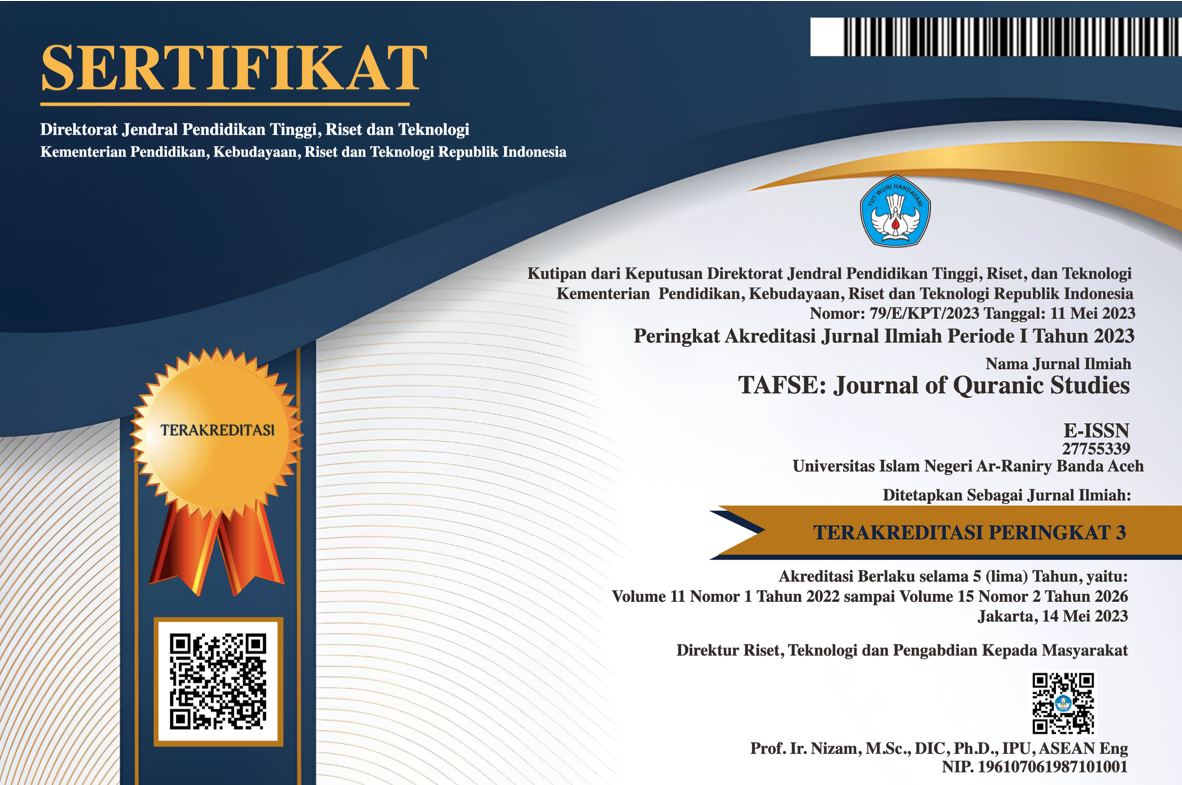Perkawinan Sedarah dalam Al-Qur’an
DOI:
https://doi.org/10.22373/tafse.v2i2.13606Keywords:
Perkawinan Sedarah, Penyakit, PsikologisAbstract
Inbreeding is considered an illegitimate marriage in Islam, only the Al-Quran and Hadith do not clearly explain the reason for the prohibition, this is different from several other prohibitions which are explained by the cause, such as the prohibition of alcohol and gambling. Therefore, this study will examine the interpretation of the mufasir about inbreeding in the Qur'an. This research is a literature study using descriptive analysis. The data was extracted using the tahlili method, which describes the content of the verses of the Qur'an from all sides, according to the order of the verses in a letter. The results show that Islam forbids marriage with close relatives and encourages it with distant relatives. This is in accordance with the science of genetics which asserts that traits in a person will be inherited, including various diseases and vulnerabilities. Both contemporary and classical commentators agree that inbreeding is prohibited because of various negative consequences that arise from psychological and sociological aspects for children and their families.
Perkawinan sedarah dinilai sebagai pernikahan yang tidak sah dalam Islam, hanya saja Al-Quran dan Hadis tidak menjelaskan secara tegas alasan pelarangan tersebut, hal ini bereda dengan beberapa larangan lain yang dijelaskan penyebanya, seperti pengharaman khamar dan judi. Karena itu, kajian ini akan mengkaji penafsiran mufasir tentang perkawinan sedarah dalam Alquran. Penelitian ini bersifat kepustakaan dengan menggunakan analisa deskriptif. Data digali dengan menggunakan metode tahlili, yaitu menguraikan kandungan ayat-ayat Alquran dari seluruh sisi, sesuai dengan urutan ayat di dalam suatu surat. Hasil penelitian menunjukkan bahwa Islam melarang pernikahan dengan keluarga dekat dan menganjurkannya dengan kerabat yang jauh. Hal ini sesuai dengan ilmu genetika yang menegaskan bahwa sifat pada seseorang akan diwariskan, termasuk berbagai penyakit dan kerentaan. Para mufasir baik (kontemporer maupun klasik) sepakat bahwa pernikahan sedarah dilarang karena berbagai akibat negatif yang muncul dari aspek psikologis dan sosiologis bagi anak dan keluarganya.
Downloads
References
Abdul Aziz Muhammad Azzam dan Abdul Wahhab Sayyed Hawwas. al-Usrah wa ahkAmuhā fi al-tasyri’ al-Islami, Terj. Abdul Majid Khon. Jakarta: Amzah, 2011.
Abu Abdillah Muhammad bin Ismail bin Ibrahim Mughirah bin Barzabah Al-Bukhari. Shahih Bukhari, Juz 8. Beirut: Dar al-Kutub al-Ilmiyyah, t.th.
Abu Al-Fida’ Ismail bin Kathir. Tafsir Alquran al-‘Aẓim, Juz 4. t.tp.:Dar al-Turath al-‘Araby, t.th.
Abu Yahya Zakariya Al-Anshary. Fath al-Wahhab, Cet. 2. Singapura: Sulaiman Mar’iy, 1999.
Adib Bisri dan Munawir AF. Al-Bisri kamus Arab-Indonesia. Surabaya: Pustaka Progressif, 1999.
Ahmad Abdus Salam ‘Atha. Damm al-Hawa, Cet. 2. Beirut: Dar al-Kutb al-‘Ilmiyyah, 1413 M.
Al-Qurthubi. Tafsir Al-Qurthubi. t.tp.: al-Maktabah al-’Arabiyah, 1968.
Bustainah As-Sayid Al-Iraqy. Asrar al-Zuwaj al-Sa’id, Terj, Kathur Suhardi. Jakarta: Pustaka Azzam, 2002.
Fakhruddin al-Razi. Tafsir Mafatih al-Ghayb. Beirut: Dar al-Fikr, 1967.
Jalaluddin al-Suyuti. Lubab al-Nuqul fi Asbab al-Nuzul. Kairo: Dar al-Taqwa, 1429 H.
Louis Ma’luf. Al-Munjid Fi al-Lughah wa al-A’lam. Beirut: Dar al-Masyriq, t.th.
M. Quraish Shihab. Tafsir Al-Misbah: Pesan, Kesan dan Keserasian Alquran. Jakarta: Lentera Hati, 2002.
Muhammad Kamil AbduÎamad. Mukjizat Ilmiah dalam Alquran, Terj. Alimin. Jakarta: Akbar Media Eka Sarana, 2003.
Sayyid Sabiq. Fiqh al-Sunnah, Jilid 3, Cet. 2. Beirut: Dar al-Fikr, 1998.
Tim Penyusun Kamus Pusat Bahasa. Kamus Besar Bahasa Indonesia, Cet. 2. Jakarta: Balai Pustaka, 2002.
Wahbah Al-Zuhaili. Fiqh Islam wa Adillatuhu, Terj, Abdil Hayyie al-Kattani, Jilid 9. Jakarta: Gema Insani, 2011.
Downloads
Published
Issue
Section
License
Authors who publish with this journal agree to the following terms:
- Authors retain copyright and grant the journal right of first publication with the work simultaneously licensed under a Creative Commons Attribution License (CC BY NC 4.0) that allows others to share the work with an acknowledgment of the work's authorship and initial publication in this journal.
- Authors are able to enter into separate, additional contractual arrangements for the non-exclusive distribution of the journal's published version of the work (e.g., post it to an institutional repository or publish it in a book), with an acknowledgment of its initial publication in this journal.
- Authors are permitted and encouraged to post their work online (e.g., in institutional repositories or on their website) prior to and during the submission process, as it can lead to productive exchanges, as well as earlier and greater citation of published work (See The Effect of Open Access).





